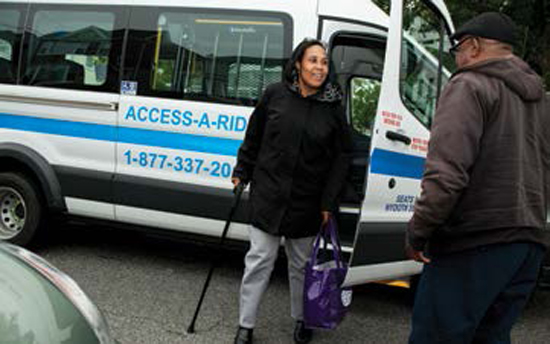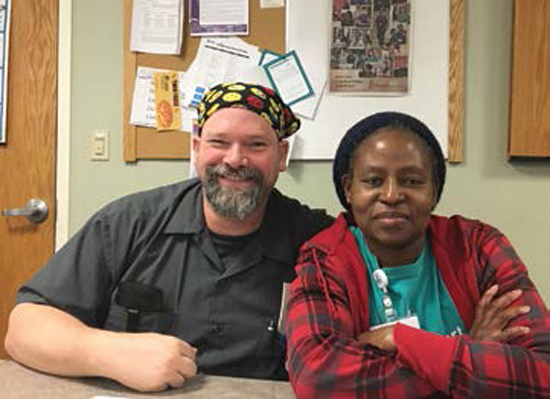Breaking Down Barriers for Members with Disabilities
July 5, 2017

Within 1199SEIU, its Caucus for Persons with Disabilities is making plans to expand the Caucus to help guarantee the rights of all members in the workplace by increasing participation of members with disabilities into the life of the Union.
A centerpiece of the disability rights movement is the Americans with Disabilities Act (ADA), the 1990 law that prohibits discrimination against a qualified individual with a mental or physical disability in employment, transportation, public accommodation, communications, and governmental activities.
The ADA also covers a broad spectrum of mental and physical conditions that need not be severe or permanent or even visible.
Blindness, deafness and mobility impairments are among the most obvious conditions protected under the statute, but diabetes, depressive disorders and less obvious physical and mental conditions also are covered. However the health coverage and the gains of the disability community are in danger.
“The Trump administration and the Republican-led Congress are a major threat to all working people, but people with disabilities are on the frontlines of their attack,” warns Marie James, a member of the Caucus, a delegate at NYU Medical Center in Manhattan and a member of the Union’s highest body, its Executive Council.
Her concern about the Trump administration is shared by the National Disability Rights Network (NDRN), a national non-profit organization that advocates for and protects the rights of persons with disabilities. It has cited administration directives on the environment, education, civil rights and other areas for their impact on the disability community.
“The passage of the American Health Care Act, and the [Congress] members who voted for it, could relegate people with disabilities to second-class status when it comes to health insurance,” the NDRN statement reads. “With their votes, they approved of people with disabilities being segregated into different insurance, forced to live in poverty and inflicted on them a great worry over how they will get health care the next time an issue arises.”
James, a secretary in NYU’s cardiology department, understands the havoc that repeal of the Affordable Care Act would wreak on all patients.
“As a disabled person, I understand the need for a support system to help people lead full productive lives,” she says. “I have a loving husband and mother at home and an accessible work environment that makes it possible to perform my duties, but that should be true for all workers with disability.”

Even with a good support system, James’s life is filled with challenges. In 1999, just one year after she helped organize the NYU clericals into 1199, she was diagnosed with multiple sclerosis. In recent years, James has been afflicted by trigeminal neuralgia, a chronic painful sporadic shock on one side of the face that lasts for seconds or sometimes minutes.
“As a secretary, I have to spend time on the phone, and I never know when the shock will occur,” James says. The neuralgia struck one recent morning with such intense pain she was unable to continue brushing her teeth.
“Since walking is difficult for me, I go to the bathroom at work just once a day,” James says. Her lack of mobility qualifies her for Access-ARide, city-contracted transportation for people with disabilities. She uses a walker to get to the van.
She notes that transportation ranks high among the issues for people with disabilities. Many disabled persons complain of cab drivers that pass them by in favor of abled passengers. Worse, are the complaints about public transportation.
In April, a group of disability organizations and residents with disabilities brought a class action lawsuit in federal and state courts to bring the NYC subway system – operated by the Metropolitan Transportation Authority – into compliance with the ADA. The suit contends that more than 75 percent of city’s 472 subway stations lack elevators or other means of transportation for riders with wheelchairs or other mobility devices.
Disabled individuals are prevented from full participation in society in a variety of ways. They include discriminatory treatment with regard to public facilities, schools and colleges and in the workplace. Preventing any group of workers from full participation weakens unity and saps power at the workplace, reads 1199’s Caucus literature.
The problem is not the disability, but abled people’s response to it.
1199 leadership at Crouse Hospital in Syracuse addresses this issue. Among the most active members at the hospital are deaf members Brian Brothers and Mildred Webb, environmental services workers on the hospital’s night shift. They are provided translators at Union meetings as well as other means of communicating. They recently spoke to 1199 Magazine through an American Sign Language interpreter.
“An advantage of working here is I’m able to defend my rights through our Union,” Brothers says. “I also have a good relationship with my co-workers. We help each other. For example, if there is an announcement over the public address system, my co-workers let me know. Since I’m not able to speak on a phone, coworkers and hospital management can communicate with me through text.”
Brothers, who also reads lips, has worked at Crouse for 17 years. Webb has been there for 38 years. “I’ve been patient, but I’d like to see more use of interpreters” she says. “Sometimes reading material is not clear. An interpreter will help to make sure that we deaf members as well as hearing individuals are clearly understood.
Also, at one time, there were six deaf members at Crouse, and now there are just four.”
“I would also like to see more balance,” Brothers says. “For instance, it would be good to have some deaf people in higher positions.”
The Union’s Caucus seeks to help the leadership clear the path to equality by tapping the talents and energy of members like James, Brothers and Webb and helping other members to understand that the problem is not a person’s disability; it is abled people’s response to it.
- 1199 Magazine - May/June 2017

